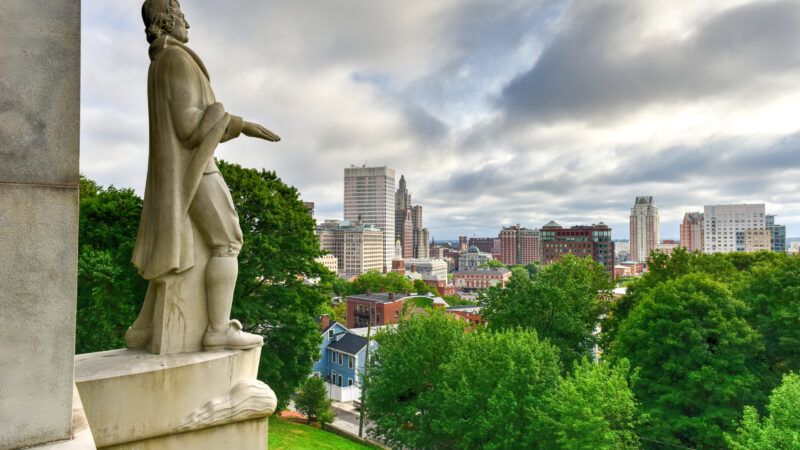Sick of the Pilgrims? Celebrate Roger Williams Instead
While we often spend Thanksgiving remembering a different set of Puritan settlers, the religious, freedom-loving Roger Williams is an apt hero for the more liberty-minded.

While the Thanksgiving holiday is normally spent in memory of the semi-mythical 1621 feast between recently arrived Puritans and local Native Americans, a settler who arrived a decade later is a much better-suited hero for the more liberty-minded among us.
Roger Williams, known best as the founder of Rhode Island, was a Puritan minister, an early advocate for the separation of church and state, and, as writer Sarah Vowell describes in her 2008 book on the early Massachusetts Bay Colony, "a fully-formed crank, a man whom even Puritans dismiss as a tad too fanatical."
However, Vowell has a soft spot for the oft-zealous minister—one I and many other libertarians share. As she writes, despite William's eccentricity and fanaticism, "He is nevertheless principled, self-confident, forthright, and true to himself."
While many early Puritan colonists can stake a claim as the most influential upon the American spirit—from John Winthrop and his "city on a hill" to the enduring cultural sticking power of the Plymouth colonists—Williams, in my view, surpasses them all. Not only did his commitment to individual religious freedom influence the stridently secular government we have today, but he also modeled a classic American troupe—the liberty-loving weirdo.
In contrast to the theocratic magistrates of the 1630s Massachusetts Bay Colony, Williams was not just a religious rebel—but a political one too. While others argued that theological unorthodoxies should result in state-sanctioned punishment, Williams disagreed. Instead, while he believed along with his fellow Calvinists that religious dissenters and most of the faithful might be hell-bound, he asserted that it's not the job of the government to set them on the righteous path.
This apparently outrageous concept, along with a series of other idiosyncratic theological disputes (let's just say there was a lot of pamphleteering involved) resulted in Williams—and by extension, his 12 children—getting booted out of Massachusetts Bay in 1636. It was wintertime, so the magistrates kindly offered to delay William's banishment for a few months, on the condition that he lay low and pipe down with those crazy ideas of his. But never one to be careful with fire when a bridge was around, Williams completely ignored this directive. More preaching got him expelled from the colony in the middle of January.
Williams thankfully managed to escape certain death in the frozen New England wilderness due to the kindness of the local Wampanoag tribe. However, come springtime, Williams decided to form a new settlement, one where his, as fellow Puritan John Winthrop put it, "diverse, new, and dangerous opinions" could thrive.
This new settlement, called "Providence Plantations," was built on land that, according to Vowell, Williams received as a gift—not conquered—from leaders of the local Narragansett tribe. "It was not price or money that could have purchased Rhode Island," Williams later wrote. "Rhode Island was purchased by love."
The colony was governed by an altogether different set of rules than the other Puritan-run settlements that dotted New England. Rather than exercising religious authority over citizens, the government of Providence pertained exclusively to "civil things," making it possibly the first place in modern history with a separation of church and state.
The settlement would eventually grow to welcome a whole host of theological misfits, from Quakers, to Jews, to my other favorite Puritan crank, Anne Hutchinson. Hutchinson had also found herself (and, like Williams, her double-digit litter of children) kicked out of Massachusetts Bay in 1638 after preaching too much for a woman (especially of the "God-talks-directly-to-me" variety). In fairness, Williams thought all these people—except maybe Hutchinson—were doomed for eternal hellfire. But as he saw it, punishing for theological wrongheadedness was a job fit only for God himself.
Williams was a unique character in America's early colonial history. Driven by, above all else, a fierce devotion to a demanding God, Williams was nonetheless unwilling to use that devotion to justify punishing dissenters. Ironically, one of the most stridently zealous Puritans ended up building one of the world's first secular governments.


Show Comments (61)